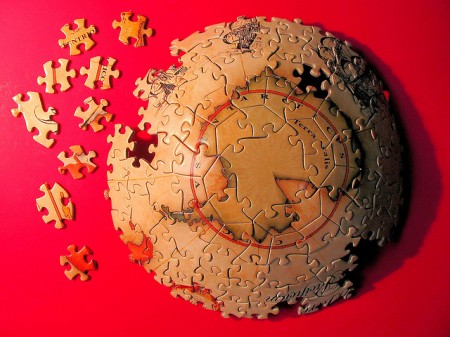
Michael Wesley comes with a thought–provoking idea: bipolarity is back, but it is not between old or new major powers or alliances, but rather between two communities of states – the Atlantic one which includes the Americas, Europe and Africa on the one hand, and Asia on the other. While the idea doesn’t convince me, it is certainly worth debating. Let me put a few question marks to it.
I guess what Michael really describes is not a ‘polarity’ of any sort (there are no poles in his picture), but rather a division between (or simply the coexistence of) different political-strategic cultures. And here, regardless of the details, he has a point.
Different ‘conceptions of how the world works’ are prevalent in different parts of the world, and they are indeed too relevant to ignore, both analytically and in practical terms. Political and strategic cultures impact on the way states deal with disputes, with issues of war and peace, and on how they cooperate or don’t cooperate with others. There are certainly important differences here between, say, the US and Japan.
But is that really an Atlantic-Asian divide? Is there an Atlantic approach to international affairs shared by policy-makers in the US, Latin America, the EU, and Africa? And another one that determines political thinking and acting throughout Asia? Where, by the way, are Russia, Australia, and the Middle East in this picture?
Other people are more qualified than I am to speak about commonalities and differences among Asian nations themselves with regard to prevailing perceptions of international norms and institutions. What was interesting for me as a European, with a clearly European view of the world, was Michael’s suggestion that Europe basically shares the American approach to international affairs, and that this approach is also shared in Latin America and Africa.
In Europe and the US in particular, we have actually been discussing our differences in this respect at least since the end of the Cold War. Europeans and Americans share basic democratic and liberal values (as do many other societies in the world), but all the debates about European multilateralism vs. American exceptionalism, the legitimacy of the use of force, the importance of international rules and regimes, or simply Mars vs Venus all show that there certainly are different ‘international affairs cultures’ at work on both sides of the Atlantic.
As the transatlantic community is tied together by values and strong interests, NATO, or the US and the EU, have for the most part been able to deal with such differences. But they always do better when they acknowledge them. Maybe this is what makes a Euro-Atlantic culture.
I am not sure that Africa and Latin America really fit in here, at least for the time being. Michael cites different countries’ attitudes to the Responsibility-to-Protect norm. But generally, Latin American and African states are much more ‘sovereignistic’ here than, particularly, the Europeans, and at least as sceptical of international interventions as India or other Asian nations.
Rather than constructing a new bipolarity in international affairs, we could perhaps try to identify a number of different international-affairs cultures. Aside from an (EU-dominated) European and a (US-dominated) American one, this could include an ASEAN-led and probably an emerging-powers approach. And all these cultures seem prone to adapt and change over time, particularly where states and their economies grow, societies become more affluent and more tied into global networks.
China is more interested in maintaining international norms and institutions today than it was under Mao. I wouldn’t exclude, though, that, with time, it develops a strategic culture which is much closer to that of today’s US than to either the European one or that of its smaller south East Asian neighbours.
States like Brazil, South Africa, Indonesia, and India are developing a stronger interest in international regimes and rules as they become more active participants in a globalised world. Given their democratic nature, they may see advantages in a European-type of multilateralism once they have reached a certain level of prosperity. But this may be just another of these European ideas about how things work in the world.
Prof. Dr. Volker Perthes heads the German Institute for International and Security Affairs (SWP) in Berlin.
This is a cross post from The Interpreter, a blog from the ISN Partner Lowy Institute for International Policy.
For further information on the topic, please view the following publications:
Beyond 2010 – European Grand Strategy in a Global Age
US Primacy, Eurasia’s New Strategic Landscape, and the Emerging Asian Order


One reply on “A New Bipolarity, or Just Different Cultures?”
This is really an interesting way to look at the divide of culture similarities. It is a new way to think about grouping different cultures to help businesses see these cultural differences. Acknowledging these differences is for global business. Thanks for these great insights!